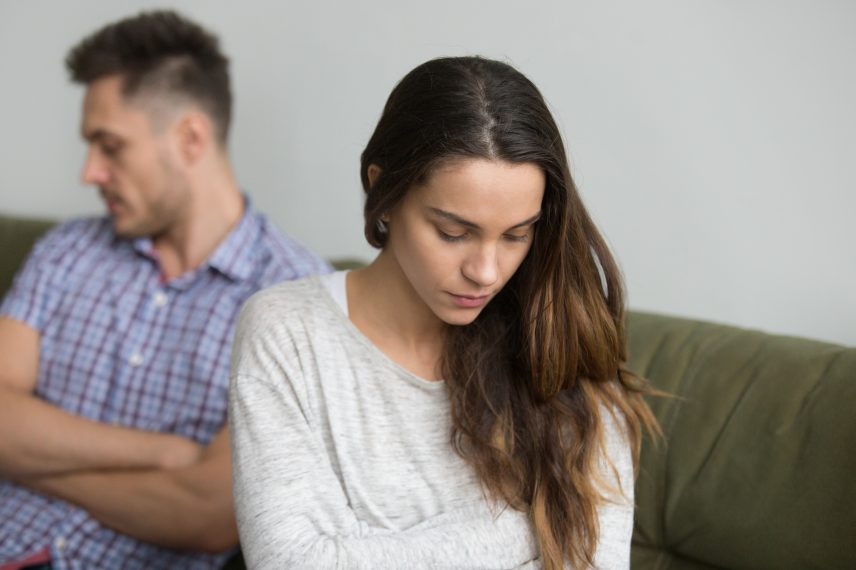Most of us think that it is easy to sense an abusive relationship. Unfortunately, the truth is that not all abuses leave black eyes, broken bones, or bruises. Abuses can be in different forms– emotional, psychological or sexual.
Abusive patterns can be hard to spot- especially for the victims. It gets even worse when the abusive partner convinces that you are the one with the problem and in need of change.
But, is there any way to figure out whether your relationship is turning toxic? Yes! When abusive behavior becomes recurrent, certain warning signs start to pop up[1]. Here are some of such signs of abuse that you need to look out for.
Feeling Afraid of Your Partner
People suffering from toxic relationship describes their life to be fragile as walking on an eggshell
The Journal of emergency medicine (2001)
What do you feel when your partner is upset or irritated? Do you feel suffocated, sweaty or start hyperventilating when your partner gets angry? A partner is someone who you can trust and rely on. In a healthy relationship, your partner’s mood should not be making you feel frightened. If you are feeling dizzy, getting sweaty palms, or can’t think straight, then it is actually your body telling that the person is not safe for you.
Living in fear is a sign of emotional abuse. Reportedly, most people suffering from this describes their life to be fragile as walking on an eggshell [2].
Making threats
Doing something for your partner is normal. But, getting threatened to do something is entirely a different scenario. Relationships are based on mutual love and understanding. Using physical violence and threats to force someone to do something can only harm your relationship.
Threats decrease the levels of perceived security and stability of the relationship. It makes you feel frightened and insecure. If you feel like your partner is making threats- even lighter ones like leaving home or divorcing you, then it’s better to have a second thought on your relationship.
Isolation
Getting isolated and not being allowed to see your friends or family is a common characteristic of an abusive relationship. Isolation begins long before you realize it. You feel afraid to go out with your friends, wondering whether it will upset your partner is the first warning sign. Unfortunately, there are far worse cases where threats and physical violence are used to keep you away from others.
Feeling Dominated And Controlled
Relationships become abusive when one partner (or both) tries to take control of the other. For some people, dominating their partner is a way of expressing their love. But you should know that there is nothing romantic in dominating someone physically, psychologically, or sexually.
Many mistake the abuser’s dominance and controlling behavior as confidence at first. But it is more of egomania or abrasive arrogance. As this abuse trivial and banal, you will feel more degraded.
Economic Abuse
Economic independence is the first step out of an abusive relationship. A study conducted on women who divorced their abusive husbands shows that one of the main factors that influenced their decision was financial independence[3].
One of the main factors that influenced women who divorced their abusive husbands was financial independence
Violence and Victims (2006)
Abusers try to keep their control and dominance by making your financial insecure. They want you to depend on them for money and for that they will not be willing to let you go for a job. Even if you do, they will prevent you from accessing the money.
Lack of Privacy
When you lose your personal space, you lose your identity and self-esteem. Setting boundaries and respecting each other is an ongoing process in a good relationship. It’s okay to share personal information like passwords and to social media, bank accounts, email, phone, etc. if you wish to. But, you should not feel forced to do it. Don’t feel bad if you feel like keeping those private.
It is always good to talk to your partner and set some ground rules about what you do and don’t wish to share. However, personal boundaries should not feel like castle walls during a siege.
Feeling Disrespected
In a healthy equal relationship, both partners deserve to be respected as autonomous individuals. Mutual respect help cultivate the feeling of safety in a relationship. If you are afraid to express your thoughts, feelings, and concerns to your partner, then it means that they are treating you as inferior not giving you the respect you deserve.
Making mutual financial decisions, parenting decisions or having healthy arguments are all part of having an equal relationship. Unfortunately, in an abusive relationship, one partner disrespects the other as abusive tactics to gain power and control.









